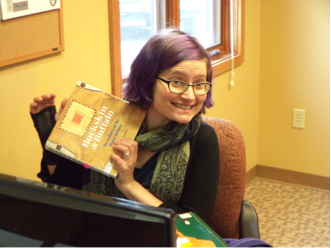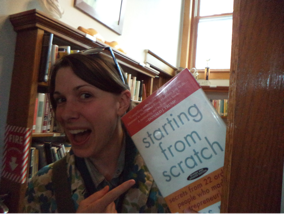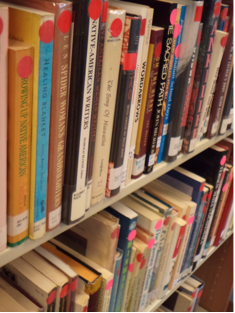With the Red Cliff Band’s Interim Library Grand Opening fast-approaching, two TLAM students were able to travel up north to help Nancy work on adding books’ call numbers into the catalog and talk in more detail about the LibraryThing catalog, classification, and subject access
We arrived in rather serendipitous timing—Nancy, the Red Cliff Librarian, was having a soft opening of the library on the last day of our trip, giving us enough time to get most of the nonfiction collections’ numbers entered into the catalog. She also informed us that the library policies we drafted for her had been approved by the library board and were pending Tribal Council approval.

Our other priority in this trip was to talk with Nancy about creating a controlled vocabulary so we can use the tagging feature in LibraryThing in a consistent way. The tagging feature allows books to be located by subject in the catalog. It is an informal system, allowing us to add as many words as we would like to each item, in any format. This provides a great deal of flexibility in organizing the collections, and doesn’t limit us to Western-centric systems like Library of Congress Subject Headings.
We have been reading in class about the problematic nature of long standing subject headings and classification systems. Holly Tomren points out in her article “Classification, Bias, and American Indian Materials” that
“American Indians are one such group of people that is adversely affected by the inherent bias built into Western library classification systems. Both the Library of Congress Classification system (LCC) and the Dewey Decimal Classification system (DDC) marginalize American Indian materials by placing them in the past (in the history section) and separate from the whole of human knowledge. Both systems also exclude numerous Native concepts, lack specificity within Native topics, fail to organize Native material in ways conducive to retrieval, and at times use offensive or outdated terminology.”
While entering the call numbers for the Native American Nonfiction collection, which is currently classified in the Dewey Decimal Classification, this was definitely apparent. As we began tagging, we wanted to be aware of the biases inherent in these systems that have been developed over long periods of time, and to choose our terms carefully. The tagging feature provides a lot of freedom but, has posed several challenges. Adding too many tags or not regulating things like capitalization, punctuation, alternate spellings, synonyms and choosing either compound or single-word tags, makes it difficult to collocate items (bring like items together in a search).
Because of such things, Nancy agreed it would be best to use a controlled vocabulary, a designated set of terms we can use consistently. The biggest challenge has come in trying to determine how to go about creating the controlled vocabulary. Because the collection focuses on Native American subjects and authors, with highly localized subjects as well, no pre-existing vocabulary or classification system exists that entirely suits our needs.
We were able to stop by the Bayfield Library to see if they had any strategies and spoke with Teresa, one of the librarians involved in cataloging. She mentioned that she supplements headings that other libraries use within the Northern Waters Library Service use with additional subject terms of local significance.
In the end, we devised a method to create our own controlled vocabulary list for subject headings and a Native/Local Names Thesaurus. We will look to Bayfield Public Library, Lac Courte Oreilles Community College Library, and Bad River Public Tribal Library as well as Sears Subject Headings (commonly used for small libraries). We will also seek input from Nancy and other tribal members to be sure that names and headings are appropriate and consult existing resources such as Xwi7xwa Library’s British Columbia First Nations Names Authority List, and the Forest County Potawatomi Library Classification.

The creation of these vocabulary will be a work and progress as we begin to tag. We are eager to get started on our return to Madison and hope to get more tags in the catalog in time for the Grand Opening in a few weeks.
– Carmela Hatch & Megann Schmitt

